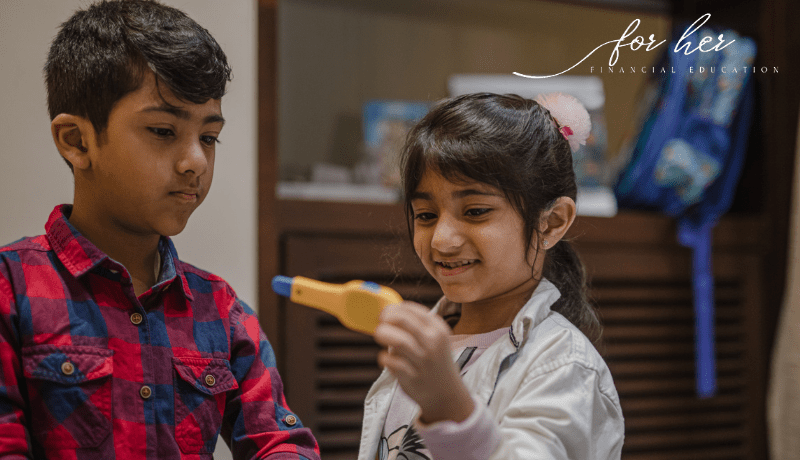As a mom, you want the absolute best for your children. This does not imply that you want children to have the most fashionable clothing, up-to-date toys, or the trendiest electronics. Most likely, you wish to keep them safe and secure. You also want to provide them with a strong and solid foundation upon which they will build their successful lives.
Teaching kids about money is not just about how to count money; it’s about teaching kids the value of money. This is often an intangible concept to children especially when they don’t have a clear grasp of: mommy going to work and receiving a paycheck or daddy using a credit card to pay for groceries.
Jemia Cunningham-Elder, a contributor at The Women’s Collection and Founder of Fit Your Life Into Your Life says, “One quick and easy way to begin teaching the value of money to your elementary and middle school children is to create a currency system for your own home. That may sound overwhelming, but trust me, it doesn’t have to be!”
Here is Jemia’s step-by-step home currency system:
1. Cut up scrap pieces of paper and sign them with your name (so that they cannot be replicated by your kids) - each signed piece of scrap paper is worth 1 Family Rupees.
2. Give the currency a name (Example: J Family Rupees).
3. Setup a way for your kids to earn Family Rupees.
4. Create a list of activities/items that can be purchased with Family Rupees.
5. Collect the Rupees from your kids when they purchase their activity/item.
The kids decorate a bank for their Rupees out of a leftover box (they used a pasta shells box). We ask them what activities/items they would like to earn and we assign a Family Rupee value to them. As parents, we decide on a list of behaviours we want to see that will earn the kids’ Rupees. The behaviour list for our family centers around community, integrity and remaining focused on their individual goals. When we see the behaviours on the list exhibited, they earn Family Rupees. For example, them deciding to help each other with Sunday chores would earn Family Rupees
This system has taught my children critical thinking skills about money. They can estimate how long it will take them to earn enough Family Rupees for a particular activity or item on their list. They’re learning how to work for what they want, how to save for what they want and how to negotiate between wants and needs. Perhaps above all, they’re learning to associate time and effort with money and value. This is a stepping-stone from saving scraps of paper to saving real money when they get their first job.
The family currency is one of many ideas parents have been using to help children with financial literacy. The reality is, even if you don't teach your children about money, they will learn it somewhere, somehow! Give your children the gift of financial literacy from an early age if you want to play a vital part in influencing their sentiments, thoughts, and beliefs regarding money. With the numerous online resources available, it’s something you can do along with them – make it a fun weekly event so that they look forward to it.
Here are some key things to consider:
1. Use available online resources
2. Keep it simple and begin with the fundamentals
3. Focus on instilling a savings habit
4. Don’t focus only on spending, consider money-making opportunities
5. Demonstrate the importance of giving
Final thoughts
Teaching our children about money and its worth is an important life skill for which we must assume responsibility. The new generation is growing up in a consumer-driven environment where they are regularly presented with opportunities to spend money.
They must be provided the proper foundations to navigate this world as adults and avoid being debt-ridden. Those foundations begin in protecting one's own home with financial literacy.
Make learning about money gratifying, and they'll get the confidence they need to become financially savvy adults.
An Investor education and Awareness initiative of Aditya Birla Sun Life Mutual Fund
All investors have to go through a one-time KYC (Know Your Customer) process. Investors to invest only with SEBI registered Mutual Funds. For further information on KYC, list of SEBI registered Mutual Funds and redressal of complaints including details about SEBI SCORES portal, visit link : https://mutualfund.adityabirlacapital.com/Investor-Education/education/kyc-and-redressal for further details.
Mutual Fund investments are subject to market risks, read all scheme related documents carefully







 1800-270-7000
1800-270-7000










